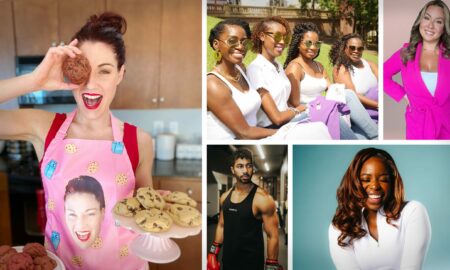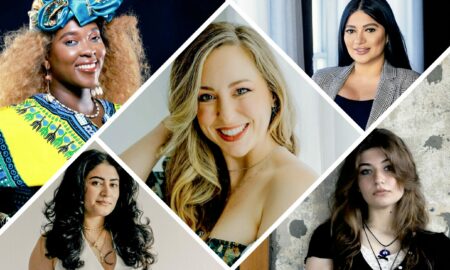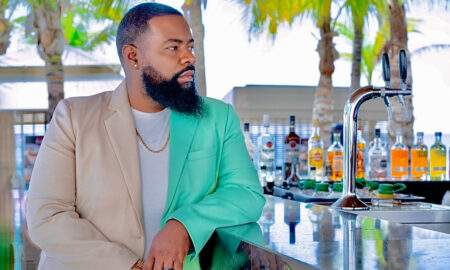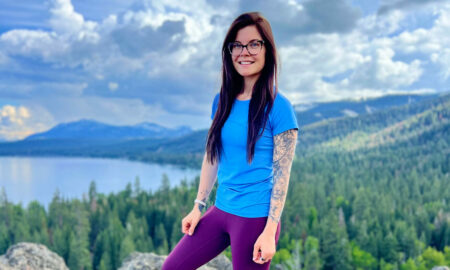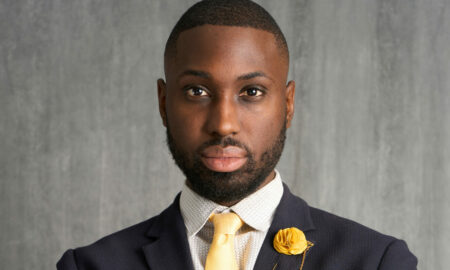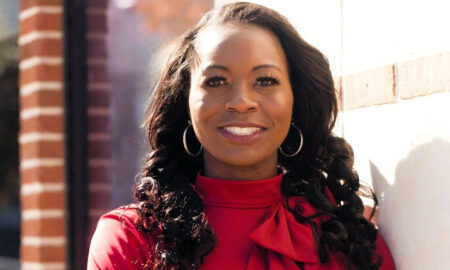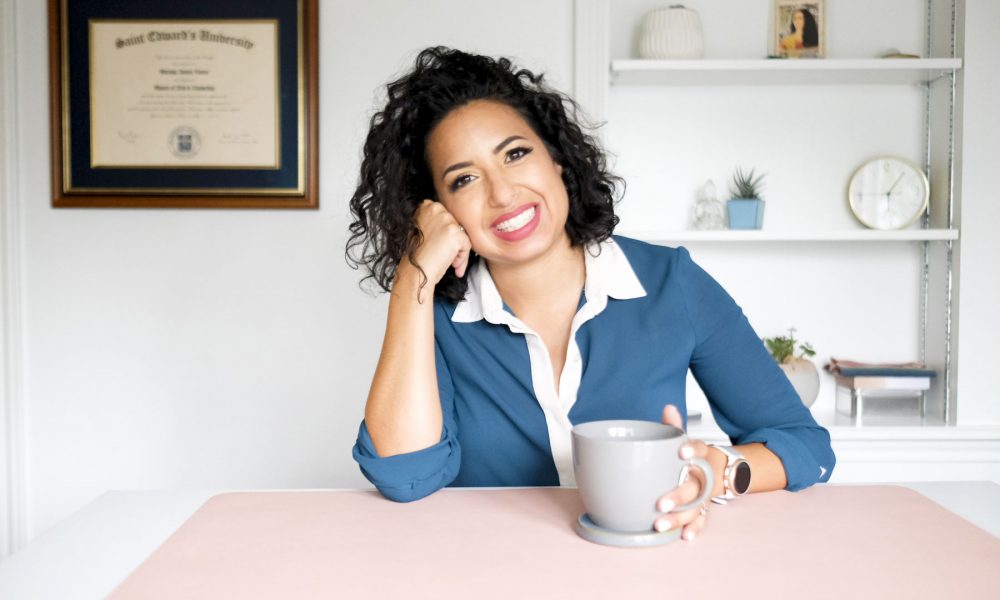

Today we’d like to introduce you to Marissa Rivera.
Can you walk us through your story – how you started and how you got to where you are today? You can include as little or as much detail as you’d like.
I was born and raised in San Antonio, Texas. My family’s background reflects the rich cultural history of Texas. My mother is a first-generation American, whose immigrant parents worked in construction and manufacturing, and as migrant field workers. On my father’s side, we are Native to this land, having both Indigenous and Mexican roots throughout South Texas.
Growing up, the combination of my family’s mixed heritage and not knowing Spanish often left me feeling like an outsider. Even as a young child I got the “Where are you ‘from’ from?” line of questioning all too familiar to my fellow ethnically ambiguous folks. This kind of interaction lets you know – and never forget – others perceive you as “different”. Add to that a burgeoning awareness in my early adolescence that I was attracted to both boys and girls (something I definitely didn’t have words for and couldn’t talk about in my conservative Catholic family), and it’s hardly a surprise that I felt the need to spread my wings beyond San Antonio!
I was very fortunate to earn admittance into Rice University after high school. Both Rice and Houston have had an immense impact on my identity, mental health, and professional goals. The intense pressure of the academic challenges Rice presented, struggling to fit in with more financially stable peers, and working in the service industry to cover my living expenses resulted in anxiety and panic attacks more often than I had before. Only, I didn’t really understand that’s what I was experiencing. “Anxiety”, “Trauma”, “Imposter Syndrome”, “PTSD”, or even “Mental Health” were unfamiliar terms in my family, and the public conversation about mental health in the early 2000s was not nearly as destigmatized as it is today. When I began reading about these conditions in textbooks and journal articles, the examples seemed similar to what I was experiencing, but lacked the context of how those issues might manifest for a first-generation college student like myself.
At the beginning of my Junior year, I finally met with a therapist at the Rice Counseling Center who helped me connect some dots, give a name to what I was experiencing, and locate an affordable therapist off-campus. Right around this same time, my interest and academic achievement in Psychology, Cognitive Science, and Neuroscience began to take off, and I started to meet more people “beyond the hedges” of Rice.
In Houston, I finally found communities that were diverse in ways I had not known in San Antonio. Because Houston provided me the opportunity to engage with people from a variety of racial, ethnic, religious, sexual, and gender identities, I began to count my own ethnically diverse, Queer femme experiences as strengths I could learn from, lean into, and celebrate.
A month after graduating, I moved to Austin, Texas to accept my first clinical position at a foster care group home for adolescents. It was an unbelievably challenging position to dive into as a 21-year-old, but over the course of the 2.5 years I was there I realized my true passion: guiding others through whatever might be blocking their untapped strengths, so that clarity and transformation could become comfortable and familiar states of being for them.
After that first job, I began graduate school at St. Edward’s University and soaked up every opportunity there was to learn more about trauma, grief and loss, and emerging therapy modalities. I enjoyed working with young people in foster care, so after earning my Master’s degree and passing my licensing board exam, I began working in public high schools as a Wellness Counselor. Over the next 6 years, I worked with countless students who had histories similar to my own: high achieving, with histories of trauma, and often with a lack of support or adequate understanding from their families.
My work in public education was especially rewarding, because beyond the amazing relationships developed with young people, it connected me with colleagues who encouraged me to achieve more, and it provided opportunities to write mental health curriculum and policy, as well as train other counselors on mindfulness, interpersonal neurobiology, and supporting LGBTQ+ students. By my 4th year in public education, I knew that I wanted to branch out on my own and start a private practice. For a year, I juggled working 40+ hours a week at the high school campus and seeing clients at my private practice twice a week in the evenings. That period was extremely stressful. Some days I felt like I’d never be able to be fully-employed by my own business, but I knew I had to have a solid foundation before making the leap from public education to being a successful entrepreneur.
During the last year of my full-time job, I saved every penny possible, started networking with other therapists in private practice, and sought out mentors (all while planning a wedding- a combination I don’t recommend). I am also grateful to have a supportive spouse who encouraged me to take that scary leap and invested $1200 to help secure my office in Downtown Austin. With the funds I had saved on my own, I was able to file business formation documents, pay a graphic designer for a logo and branding, afford the increase in malpractice insurance, hire a business coach (who is also a Latina therapist), pay office rent for my first 3 months, and fund all the other miscellaneous expenses you can’t predict when starting a business.
Owning my own business and seeing clients in private practice has been overwhelming at times, but it has allowed me to expand my offerings and engage with a larger community. I now also guest-lecture for graduate programs at universities, train counselors in surrounding cities, and speak nationally about providing culturally competent mental healthcare for folks in marginalized communities. I’ve always loved the work I do, but doing so in the context of being an entrepreneur has added a sense of belonging I never felt before. “Belonging” might sound misplaced, since the word “entrepreneur” usually conjures up the image of a lone person doing everything solo. But since starting this chapter of my career, the intentional, authentic relationships I’ve formed with other entrepreneurs have inspired me to embrace vulnerability when asking for help and motivated me to continue challenging myself.
Has it been a smooth road? If not, what were some of the struggles along the way?
I think coming from a working-class background and not having a sound relationship with money made for a pretty bumpy road. Needing to work full-time during both undergrad and grad school was something beyond stressful. A lot of people do it, but it wasn’t the norm at the schools I attended, and it made life very isolating at times. I was in survival mode a lot – hence the panic attacks. Saving money, much less investing it, was not a skill taught in my family, so the idea of ever owning my own business seemed wild to me. It wasn’t until after grad school that I began to meet other Women of Color and other Queer folks who came from similar backgrounds, owned their own businesses, and showed me that entrepreneurship was actually an attainable goal. Learning from people with whom I could relate made it so much easier to be vulnerable and ask those business formation and finance questions I was struggling to wrap my head around. As a clinician, I always felt confident and skillful. But as an entrepreneur, I doubted myself a lot and owe so much to my colleagues and mentors from whom I gained the confidence and knowledge needed to forge ahead.
Another difficulty was finding a community of mental healthcare providers who reflected my own diversity, were building businesses, and leaning into their creative forces. I think what most people don’t realize about the licensing process for therapists is how long it is and how little positions pay while you’re provisionally licensed. For Licensed Professional Counselors in Texas, once you complete grad school and pass a licensing exam, you are granted a provisional license which allows you to practice under the clinical supervision of a fully-licensed supervising therapist. That provisional licensing period lasts for 3000 clinical hours (which take anywhere from 1.5 to 5 years to complete), and you have to pay for weekly clinical supervision (~$400/month, on the low end). Most agency positions for provisionally licensed therapists pay around $38k or less. This might sound decent, as long as you don’t have student loans and live in a city with an affordable cost of living (cue The Price is Right losing horn if you live in Austin). I draw this very real picture to highlight that for many folks who come from economically marginalized communities, the licensing process is financially daunting and many don’t complete it. Sadly, this is reflected in the lack of representation of People of Color and LGBTQ+ folks in Austin’s community of mental healthcare providers.
Despite these challenges, the diversity of Austin’s mental healthcare providers has begun to improve over the last couple of years. I think this is in part because of the intentional creation of communities and support groups for clinicians who are POC and LGBTQ+ (shoutout to Austin Therapists of Color, The Rare Bird Society, and the folks who facilitate these much needed spaces). As with so many other things in life, when you have a strong sense of belonging and see yourself represented in your community, it’s much easier to make room for the vulnerability and authenticity required for growth as a business owner.
Tell us about your business/company. What do you do, what do you specialize in, what are you known for, etc. What are you most proud of as a company? What sets you apart from others?
Ola Wellness is the name of my private practice located in Downtown Austin. I chose that name for a couple different reasons. “Ola” means “wave” in Spanish. Along my journey toward wellness, Dr. Jon Kabat-Zinn’s writings on mindfulness helped transform my thinking about mindfulness practices. One quote that always stuck with me was from his book, Wherever You Go, There You Are:
“You can’t stop the waves, but you can learn to surf.”
For me, it communicates a very empowering and practical idea. Although we can’t always control what life throws at us, we can adjust how we react.
It was also important for me to use “Wellness” in the name of my business, because I strongly believe mental healthcare should be part of our normal, proactive health routines…like brushing your teeth, working out, eating healthy, or going to your primary care physician every year.
In clinical terms, I specialize in working with folks struggling with anxiety, grief/loss, identity development, and trauma. On my website, I intentionally use non-clinical language to describe how a person might experience any of those diagnoses because that’s what most clients can relate to.
I think the ease, humor, and directness with which I relate to people is part of what sets me apart from a lot of clinicians in private practice. If you’re sitting in my office or in one of my lectures, there’s a good chance you’ll hear a reference to my favorite hip-hop artist or sci-fi saga and still walk away with a better understanding of your own neurobiology, thoughts, and emotions. In the process of providing psychoeducation, and normalizing and reframing people’s inner and outer worlds, I believe that appropriately-timed humor can welcome self-compassion, authenticity, and kindness into otherwise difficult or historically taboo spaces. To do that successfully, you have to be solid in your clinical knowledge and expertise, as well as attuned to who’s in the room. That combination of humor, expertise, and attunement is in part what makes me unique as a therapist, and more importantly, what has made people comfortable sharing their individual journeys with me.
I’m very proud that Ola Wellness provides a space for people to bravely unlock the healing potential they already have within.
What role has luck (good luck or bad luck) played in your life and business?
As I mentioned before, the licensing process for therapists can be daunting. I was very fortunate to earn practicum and intern positions during my provisional licensing period that were paid and offered a stipend for my clinical supervision.
In general, I think I’m very lucky to live during a time when conversations about mental health, equity, justice, and queerness are increasingly more open and normal. To have mentors in my life – from my high school Latin teacher to the entrepreneurs and clinicians beside me today – who have celebrated and validated my point of view, experiences, and expertise has been an incredible gift and one that I recognize may not have been granted if I had been born at another time in America’s history.
Is there any pricing information that is relevant to our readers? If so, and if you would like us to share it, please include details (in bullet form) below.
Pricing:
- Individual Therapy: $150/session (limited sliding-scale openings available)
- Group Therapy: $60/session
- Phone Consultation (15-minutes): Free
Contact Info:
- Website: www.ola-wellness.com
- Email: info@ola-wellness.com
- Instagram: @olawellnessatx




 Image Credit:
Image Credit:
Bailey Toksoz, Ryan Andrews
Getting in touch: VoyageHouston is built on recommendations from the community; it’s how we uncover hidden gems, so if you know someone who deserves recognition please let us know here.

